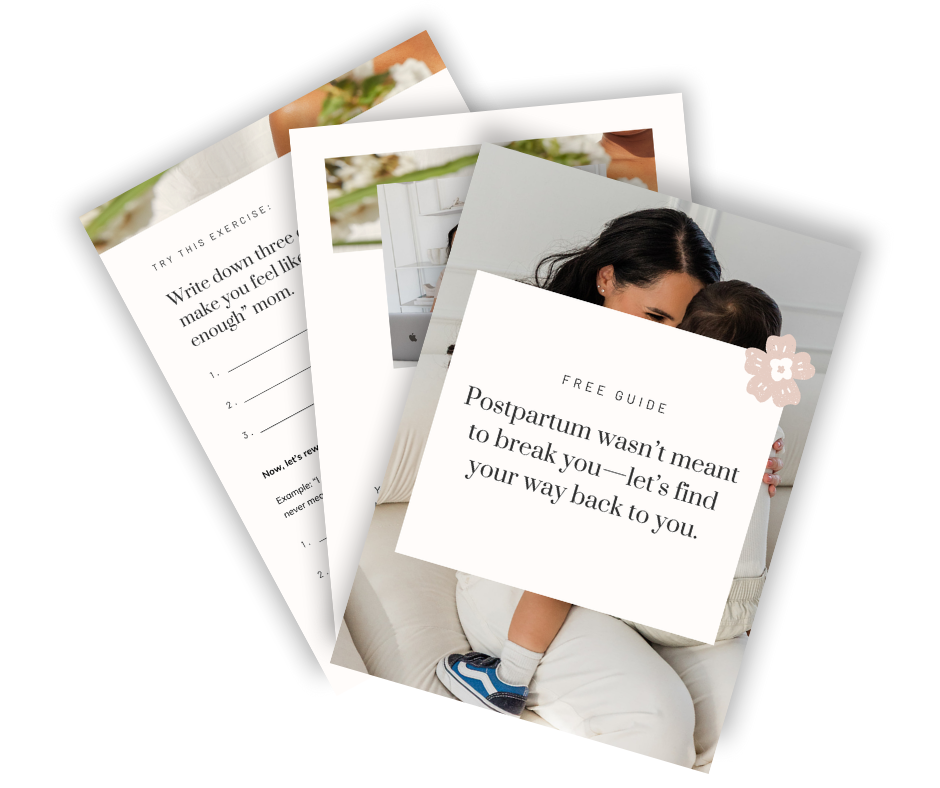Postpartum PTSD therapy in Los Angeles
Postpartum PTSD (also called birth trauma PTSD) can make you feel stuck in the moment of trauma, unable to move forward. Flashbacks, nightmares, and a constant sense of anxiety may feel like evidence that something is still wrong—even when everyone around you says you’re “fine.”
In case you are new here, I’m Karla Hernandez, a maternal mental health therapist specializing in postpartum PTSD therapy. If you’re struggling with birth trauma, panic attacks, or overwhelming fear after giving birth, you are not alone.
As a therapist for new moms in Los Angeles , I help mothers process their trauma, regain a sense of safety, and find relief from the emotional and physical distress of postpartum PTSD.
What is postpartum PTSD therapy?
Postpartum PTSD therapy helps mothers process and heal from the traumatic experiences surrounding birth, medical interventions, or unexpected postpartum complications.
- Unlike postpartum depression, which often involves sadness and disconnection, postpartum PTSD is rooted in trauma—meaning the brain and body continue to react as if the danger is still present.
- Many mothers with postpartum PTSD experience:
- Flashbacks, nightmares, or intrusive memories of a traumatic birth or postpartum experience
- Panic attacks or extreme anxiety triggered by medical settings, newborn care, or memories of the event
- Feeling detached or emotionally numb, as if they are watching their life from the outside
- Avoiding doctors, hospitals, or even talking about the birth because it feels too overwhelming
- Hypervigilance—always on edge, waiting for something bad to happen
- Feeling unsafe, even in situations where they logically know they are okay
If these symptoms sound familiar, therapy can help you process your experience and regain control over your emotions.
Most common symptoms of postpartum PTSD
If you’re experiencing postpartum PTSD, you may notice:
- Reliving the traumatic event through flashbacks or intrusive memories
- Avoidance of medical settings, doctors, or anything that reminds you of the birth
- Feeling emotionally disconnected from yourself, your baby, or your loved ones
- Intense fear that something bad will happen to your baby
- Difficulty sleeping due to nightmares or constant hyper-awareness
- A sense of detachment, as if you’re “going through the motions” but not fully present
- Irritability, anger, or extreme emotional reactions that feel out of control
These reactions are not a sign of weakness—they are a natural response to trauma. With the right support, you can break free from survival mode and begin to heal.
How do I know if I have postpartum PTSD or just birth trauma?
Birth trauma and postpartum PTSD can feel similar, but there’s a key difference:
- Birth trauma is an emotional response to a distressing birth experience that may cause sadness, grief, or anxiety.
- Postpartum PTSD occurs when trauma symptoms—like flashbacks, avoidance, and hypervigilance—interfere with daily life and make it feel impossible to move forward.
If you can’t stop replaying the birth, avoid anything that reminds you of it, or feel constantly on edge, postpartum PTSD therapy can help.
How I treat postpartum PTSD in Los Angeles
My approach to postpartum PTSD therapy in Los Angeles is trauma-informed, compassionate, and evidence-based. Together, we will focus on:
- Helping you process the traumatic event in a way that feels safe
- Releasing stored trauma in the body through nervous system regulation
- Reducing flashbacks, nightmares, and hypervigilance with proven therapy techniques
- Identifying triggers and creating coping strategies to regain control
- Reconnecting with yourself, your baby, and your body in a way that feels empowering
I use a combination of:
- Eye Movement Desensitization and Reprocessing (EMDR) to help you make sense of your traumatic experience.
- Somatic therapy techniques to help regulate your nervous system and reduce physical stress responses
- Mindfulness and grounding techniques to manage anxiety and panic symptoms
Healing from postpartum PTSD is not about erasing what happened—it’s about learning how to live without fear and reclaiming your sense of safety.
What topics can we talk about in therapy for postpartum PTSD?
Every mother’s experience is different, but therapy may include:
- Processing the traumatic birth experience in a safe, controlled way
- Understanding and reducing triggers that cause flashbacks or panic attacks
- Releasing trauma stored in the body through nervous system regulation
- Rebuilding emotional connection with your baby, body, and loved ones
- Creating strategies to navigate medical settings, follow-ups, or future pregnancies
Therapy provides a safe place to unpack the trauma, process it at your own pace, and start feeling like yourself again.
Ready to get started?
Book a consultation call
No pressure, no judgment—just a space to share what you’re going through and see if this support feels right for you.
Let’s meet where you are
Whether you’re running on no sleep, feeling stuck in survival mode, or just need someone to validate how hard this is, we’ll start from exactly where you are.
Start healing and thriving in your motherhood
With the right support, you can release the guilt, find balance, and reconnect with yourself—because you deserve to feel whole, not just needed.
Postpartum PTSD therapy specialist in Los Angeles

I specialize in postpartum PTSD therapy in Los Angeles, helping mothers process and heal from the lingering impact of traumatic birth experiences. Whether your trauma stems from a medical emergency, feeling unheard during labor, or a deep sense that something went wrong—this space is here to hold your story with care and without judgment.
You’re not “too sensitive” or “overreacting”—your nervous system remembers what your mind is trying to make sense of. Therapy can help you move out of survival mode and into safety, one step at a time.
Tips & resources for coping with postpartum PTSD
- Practice grounding techniques—deep breathing, sensory exercises, and mindfulness can help in moments of distress
- Talk about your experience—trauma thrives in silence, but sharing can help you process what happened
- Identify and avoid unnecessary triggers—but work on processing the unavoidable ones in therapy
- Prioritize body-based healing—trauma isn’t just in your mind, it’s in your body, too
- Consider professional support—healing from PTSD doesn’t have to be done alone
If you are struggling, seeking therapy is not a sign of weakness—it’s a step toward reclaiming your peace and power.

Hello! I'm Karla Hernández
LCSW perinatal and postpartum therapist serving women in Los Angeles and surrounding areas
I help new moms in Los Angeles navigate postpartum anxiety, depression, and the emotional shifts of motherhood. After experiencing my own struggles, I saw how much real support is missing for mothers. My practice is here to change that—offering trauma-informed, compassionate care that meets you exactly where you are. You don’t have to do this alone.

Book your therapy for PTSD in Los Angeles, California
- Intake (50 to 60 minutes) $200
- 50 minute individual therapy sessions are $200
- I accept Aetna and Cigna insurance
- Additionally I partner with Mentaya, who may help you get reimbursed for your therapy sessions through out of network benefits (I have a link to check benefits instantly to see if you qualify)
FAQ
What causes PTSD after giving birth?
Postpartum PTSD can be caused by traumatic birth experiences, medical complications, emergency interventions, loss of control, or feeling unheard during labor and delivery.
What is postpartum psychosis?
Postpartum psychosis is a rare but severe mental health condition that causes hallucinations, delusions, paranoia, or extreme mood shifts. It is different from postpartum PTSD but requires immediate medical attention.
What are the symptoms of PTSD after giving birth?
Symptoms include flashbacks, panic attacks, hypervigilance, emotional numbness, avoidance, and feeling constantly on edge.
How long can postpartum PTSD last?
Without treatment, postpartum PTSD can last for months or even years. Therapy can help reduce symptoms and support long-term healing.
Is it normal to avoid talking about my birth experience, and why am I so anxious?
Yes, many mothers avoid discussing their birth if it was traumatic. Anxiety is often linked to unresolved trauma, and therapy can help you process it at your own pace.